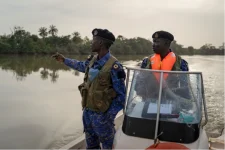Navy boats patrol the River Gambia looking for illegal fishing nets that hurt fish populations. These small mesh nets catch baby fish before they grow up, making fewer fish available for local people who need them. Chief Officer Ngum leads these patrols because he wants future generations to keep fishing these waters. His team works as part of a larger program that protects natural areas across The Gambia.
The country has restored 340 square kilometers of rivers, coasts, and forests in recent years. UNEP helped create jobs through this conservation work after years of environmental damage. The Gambia sits along one of West Africa's biggest rivers but faces pressure from its growing population. People cut mangrove trees for firewood and drain wetlands for farms.
Women benefit from these protection efforts through oyster farming, where mangroves grow back. Project teams trained 16,000 people to plant and care for these important trees that shelter young sea life. The Navy built a new base, replacing hot tents with proper buildings. Local fisher Mohammed Conteh says catches improved when illegal anglers disappeared after hearing boat engines patrolling nearby.
The country has restored 340 square kilometers of rivers, coasts, and forests in recent years. UNEP helped create jobs through this conservation work after years of environmental damage. The Gambia sits along one of West Africa's biggest rivers but faces pressure from its growing population. People cut mangrove trees for firewood and drain wetlands for farms.
Women benefit from these protection efforts through oyster farming, where mangroves grow back. Project teams trained 16,000 people to plant and care for these important trees that shelter young sea life. The Navy built a new base, replacing hot tents with proper buildings. Local fisher Mohammed Conteh says catches improved when illegal anglers disappeared after hearing boat engines patrolling nearby.












